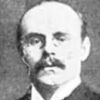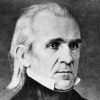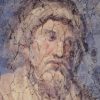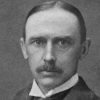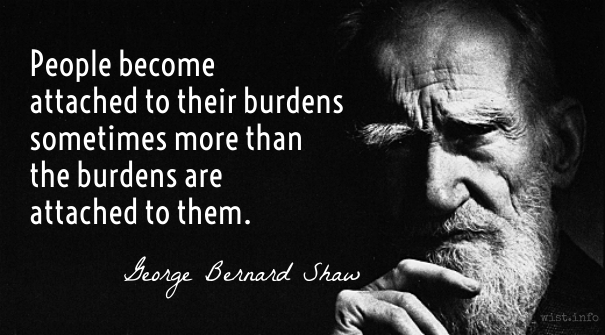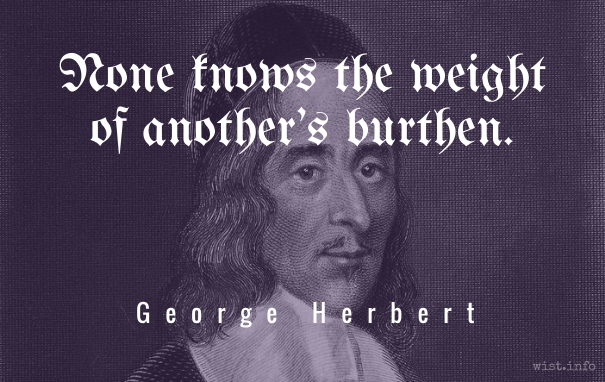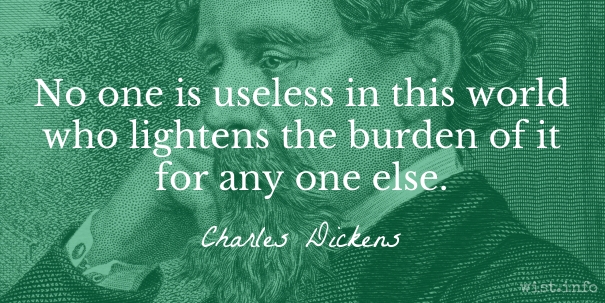He called to mind all the millionaires he had ever read or heard of; they didn’t seem to get much fun out of their riches. The majority of them were martyrs to dyspepsia. They were often weighed down by the cares and responsibilities of their position; the only people who were unable to obtain an audience of them at any time were their friends; they lived in a glare of publicity, and every post brought them hundreds of begging letters, and a few threats; their children were in constant danger from kidnappers, and they themselves, after knowing no rest in life, could not be certain that even their tombs would be undisturbed. Whether they were extravagant or thrifty, they were equally maligned, and, whatever the fortune they left behind them, they could be absolutely certain that, in a couple of generations, it would be entirely dissipated.
F. Anstey (1856-1934) English novelist and journalist (pseud. of Thomas Anstey Guthrie)
The Brass Bottle, ch. 7 (1900)
(Source)
Quotations about:
burden
Note not all quotations have been tagged, so Search may find additional quotes on this topic.
For love of God, cheerfully endure everything — labour, sorrow, temptation, provocation, anxiety, necessity, weakness, injury and insult; censure, humiliation, disgrace, contradiction and contempt. All these things foster your growth in virtue, for they test the unproved servant of Christ, and form the jewels of his heavenly crown.
[Pro amore Dei debes omnia libenter subire , labores scilicet et dolores, tentationes et vexationes, anxietates et necessitates , infirmitates , injurias, oblocutiones , reprehensiones, humiliationes, confusiones, correctiones et despectiones. Haec juvant ad virtutem , haec probant Christi tironem, haec fabricant coelestem coronam.]
Thomas à Kempis (c. 1380-1471) German-Dutch priest, author
The Imitation of Christ [De Imitatione Christi], Book 3, ch. 5, v. 2 (3.5.2) (c. 1418-27) [tr. Sherley-Price (1952)]
(Source)
(Source (Latin)). Alternate translations:
For the love of God thou oughtest to suffer gladly all things, that is to say, all labours, sorrows, temptations, vexations, anguishes, neediness, sickness, injuries, evil sayings, reprovings, oppressions, confusions, corrections, and despisings. These help a man greatly to virtue, these prove the true knight of Christ, and make ready for him the heavenly crown.
[tr. Whitford/Raynal (1530/1871)]
You ought gladly to suffer all things for the love of God: all labors, sorrows, temptations, vexations; all anguish, need, sickness, injuries, evil sayings, reproaches; all oppressions, confusions, corrections, and despisings. These greatly help a man to virtue; these prove the true knight of Christ and prepare for him a heavenly crown.
[tr. Whitford/Gardiner (1530/1955)]
Thou oughtest for the love of God willingly to undergoe whatsoever labours, to endure whatsoever griefes, temptations, vexations, anxieties, necessities, infirmities, onjuries, detractions, reprehensions, humiliations, confusions, corrections, and contempts. These helpe to the attaining of vertue: these try a Novice of Christ, these make up an heavenly Crowne.
[tr. Page (1639), 3.35.8-9]
In obedience to his Will, you should contentedly undergo Labour and Toil, Tryals and Troubles, Distress and Anguish of Heart, Poverty and Want, Infirmities and Diseases, Injuries and Affronts, Scandal and Reproach, Disparagement and Disgrace, Punishment and Torture. These whet and brighten a Christian's Virtue, exercise and distinguish him. These Thorns are woven into Wreaths of Glory.
[tr. Stanhope (1696; 1706 ed.), 3.40]
For the love of God, therefore, thou must cheerfully and patiently endure labor and sorrow, persecution, temptation, and anxiety, poverty, and want, pain and sickness, detraction, reproof, humiliation, confusion, correction and contempt. By these the virtues of the new man Christ Jesus are exercised and strengthened; these form the ornaments of his celestial crown.
[tr. Payne (1803), 3.27.8]
For the love of God thou oughtest cheerfully to undergo all things, that is to say, all labour and pain, temptation, vexation, anxiety, necessity, infirmity, injury, obloquy, reproof, humiliation, confusion, correction, and scorn [of every kind and degree.] These help to virtue; these are the trial of a novice in Christ; these frame the heavenly Crown.
[ed. Parker (1841)]
For the love of GOD, therefore, thou must cheerfully and patiently endure all things: labour and sorrow, temptation, vexation and anxiety, poverty and want, pain and sickness, detraction, reproof, humiliation, confusion, correction, and contempt. These help to virtue; these prove "the new man in Christ Jesus; these obtain for him the celestial crown.
[tr. Dibdin (1851), 3.31.2]
Thou must be willing, for the love of God, to suffer all things, viz., labours and sorrows, temptations and vexations, anxieties, necessities, sicknesses, injuries, obloquy, reproof, humiliation, shame, correction, and contempt. These things help to obtain virtue; these prove the young soldier of Christ; these weave a heavenly crown.
[ed. Bagster (1860)]
For the love of God thou must willingly undergo all things, whether labours or sorrows, temptations, vexations, anxieties, necessities, infirmities, injuries, gainsayings, rebukes, humiliations, confusions, corrections, despisings; these things help unto virtue, these things prove the scholar of Christ; these things fashion the heavenly crown.
[tr. Benham (1874)]
For the love of God thou oughtest cheerfully to undergo all labour, grief, temptation, vexation, anxiety, necessity, infirmity, injury, detraction, reproof, humiliation, shame, correction, and scorn. These help to virtue; these are the trial of a babe in Christ; of these consist the heavenly crown.
[tr. Anon. (1901)]
For love of God you should undergo all things cheerfully, all labors and sorrows, temptations and trials, anxieties, weaknesses, necessities, injuries, slanders, rebukes, humiliations, confusions, corrections, and contempt. For these are helps to virtue. These are the trials of Christ's recruit. These form the heavenly crown.
[tr. Croft/Bolton (1940)]
For love of God you should undergo everything cheerfully: for example, toils and pains, trials, vexations, anxieties, wants, sickness, wrongs, contradictions, reproofs, humiliations, distresses, corrections, and contempt. These are aids to character: these test the soldier of Christ: these shape the heavenly crown.
[tr. Daplyn (1952)]
For the love of God you ought to endure with gladness all that befalls you: toil and sorrow, temptations, afflictions, anxiety, want, weakness, injury and slander, rebuke, humiliation, shame, correction and scorn. All these things are aids to holiness; they test the man who has newly entered the service of Christ, and go to the making of his heavenly crown.
[tr. Knox-Oakley (1959)]
For love of God you should be prepared to endure anything -- toil, pain, temptation, vexation, anxiety, need, weakness, injustice, slander, blame, humiliation, shame, censure and contempt. Such things strengthen virtue; they test the soldier of Christ and make up his heavenly crown.
[tr. Knott (1962)]
The love of God should make you put up with everything: toil and sorrow, trials, annoyance, anxiety, restriction, weakness, injury, detraction, criticism, humiliation, shame, correction and contempt. These are aids to virtue. They are tests for one newly committed to Christ. They are the things that make up the heavenly crown.
[tr. Rooney (1979)]
Certainly you should willingly endure labor and sorrows, temptations, vexations, anxieties, necessities, illnesses, injuries, contradictions, rebukes, humiliations, doubts, chastisements and contempt. These things are all aids to virtue; these test one who has begun to follow Christ; these mold a heavenly crown.
[tr. Creasy (1989)]
Life beats down and crushes the soul, and art reminds you that you have one.
Stella Adler (1901-1992) American actor and acting teacher
Quoted in Barry Paris, ed., Stella Adler on America’s Master Playwrights, Introduction (2012)
(Source)
Shame is not of his soul; nor understood,
The greatest evil and the greatest good.[οὐδέ οἱ αἰδὼς
γίγνεται, ἥ τ᾽ ἄνδρας μέγα σίνεται ἠδ᾽ ὀνίνησι.]Homer (fl. 7th-8th C. BC) Greek author
The Iliad [Ἰλιάς], Book 24, l. 44ff (24.44) [Apollo] (c. 750 BC) [tr. Pope (1715-20)]
(Source)
Speaking of Achilles' mistreatment of Hector's corpse. Pope footnotes: "This is obscure. The original is, 'He has no shame, shame which harms men much, and profits them much.' Dr. Leat, following an ancient critic, thinks the passage an interpolation."
Alternate translations:
And shame, a quality
Of so much weight, that both it helps and hurts excessively
Men in their manners, is not known, nor hath the pow’r to be,
In this man’s being.
[tr. Chapman (1611), l. 47ff]
Shame, man’s blessing or his curse.
[tr. Cowper (1791), l. 58]
Cowper footnotes: "His blessing, if he is properly influenced by it; his curse in its consequences if he is deaf to its dictates."
Nor in him is there sense of shame, which greatly hurts and profits men.
[tr. Buckley (1860)]
Conscience, arbiter of good and ill.
[tr. Derby (1864)]
Neither hath he shame, that doth both harm and profit men greatly.
[tr. Leaf/Lang/Myers (1891)]
That conscience which at once so greatly banes yet greatly boons him that will heed it.
[tr. Butler (1898)]
Neither is shame in his heart, the which harmeth men greatly and profiteth them withal.
[tr. Murray (1924)]
There is not in him any shame; which does much harm to men but profits them also.
[tr. Lattimore (1951)]
He has no shame -- that gift that hinders mortals but helps them, too.
[tr. Fitzgerald (1974)]
No shame in the man,
shame that does great harm or drives men on to good.
[tr. Fagles (1990), l. 52ff]
Shame and respect no
longer he has, which harm men greatly but profit them also.
[tr. Merrill (2007)]
For friendship adds a brighter radiance to prosperity and lessens the burden of adversity by dividing and sharing it.
[Nam et secundas res splendidiores facit amicitia et adversas partiens communicansque leviores.]
Marcus Tullius Cicero (106-43 BC) Roman orator, statesman, philosopher
Laelius De Amicitia [Laelius on Friendship], ch. 6 / sec. 22 (44 BC) [tr. Falconer (1923)]
(Source)
Alternate translations:
- "Friendship improves happiness and abates misery, by the doubling of our joy and the dividing of our grief." [tr. Addison (1711), Spectator, #68 (18 May 1711)]
- "For prosperity, friendship renders more brilliant, and adversity more supportable, by dividing and communicating it." [tr. Edmonds (1871)]
- "Such friendship at once enhances the lustre of prosperity, and by dividing and sharing adversity lessens its burden." [tr. Peabody (1887)]
- "For friendship both makes favourable things more splendid and disasters lighter, by splitting and sharing them." [Source]
If the more aged and experienced men who have filled the office of President of the United States even in the infancy of the Republic distrusted their ability to discharge the duties of that exalted station, what ought not to be the apprehensions of one so much younger and less endowed now that our domain extends from ocean to ocean, that our people have so greatly increased in numbers, and at a time when so great diversity of opinion prevails in regard to the principles and policy which should characterize the administration of our Government? Well may the boldest fear and the wisest tremble when incurring responsibilities on which may depend our country’s peace and prosperity, and in some degree the hopes and happiness of the whole human family.
James K. Polk (1795-1849) American lawyer, politician, US President (1845-1849)
Inaugural Address (4 Mar 1845)
(Source)
What makes people hard-hearted is this, that each man has, or thinks he has, as much as he can bear in his own troubles.
[Was die Menschen hartherzig macht, is Dieses, daß jeder an seinen eigenen Plagen genug zu tragen hat, oder doch es meint.]
Arthur Schopenhauer (1788-1860) German philosopher
Parerga and Paralipomena, Vol. 2, ch. 26 “Psychological Observations [Psychologische Bemerkungen],” § 325 (1851) [tr. Saunders (1890)]
(Source)
(Source (German)). Alternate translation:
What makes a man hard-hearted is this, that each man has, or fancies he has, sufficient in his own troubles to bear.
[tr. Dircks]
It is with life just as with swimming; that man is the most expert who is the most disengaged from all encumbrances.
[Ad vivendum velut ad natandum is melior qui onere liberior.]
Apuleius (AD c. 124 - c. 170) Numidian Roman writer, philosopher, rhetorician [Lucius Apuleius Madaurensis]
Apologia; or, A Discourse on Magic [Apologia; seu, Pro Se de Magia], ch. 21 [tr. Bohn’s (1853)]
(Source)
Alt. trans.:
- "We live, just as we swim, all the better for being but lightly burdened." [tr. Butler (1909)]
- "He is better equipped for life, as for swimming, who has the less to carry."
What stuck in the minds of these men who had become murderers was simply the notion of being involved in something historic, grandiose, unique (“a great task that occurs once in two thousand years”), which must therefore be difficult to bear. This was important, because the murderers were not sadists or killers by nature; on the contrary, a systematic effort was made to weed out all those who derived physical pleasure from what they did. […] Hence the problem was how to overcome not so much their conscience as the animal pity by which all normal men are affected in the presence of physical suffering. The trick used by Himmler — who apparently was rather strongly afflicted by these instinctive reactions himself — was very simple and probably very effective; it consisted in turning these instincts around, as it were, in directing them toward the self. So that instead of saying: What horrible things I did to people!, the murderers would be able to say: What horrible things I had to watch in the pursuance of my duties, how heavily the task weighed upon my shoulders!
Hannah Arendt (1906-1975) German-American philosopher, political theorist
Eichmann in Jerusalem: A Report on the Banality of Evil, ch. 6 (1963)
(Source)
After all, the saddest thing that can happen to a man is to carry no burden. To be bent under too great a load is bad; to be crushed by it is lamentable, but even in that there are possibilities that are glorious. But to carry no load at all — there is nothing in that. No one seems to arrive at any goal really worth reaching in this world who does not come to it heavy laden.
Edward Sandford Martin (1856-1939) American writer and editor
In a New Century, ch. 21 “Deafness” (1903)
Quoted by Theodore Roosevelt, Speech, New York State Agricultural Association, Syracuse (7 Sep 1903).
To Herbert Westbrook, without whose never-failing advice, help, and encouragement, this book would have been finished in half the time.
P. G. Wodehouse (1881-1975) Anglo-American humorist, playwright and lyricist [Pelham Grenville Wodehouse]
A Gentleman of Leisure, Dedication (1910)
(Source)
As I walked out the door toward my freedom, I knew that if I did not leave all the anger, hatred, and bitterness behind, that I would still be in prison.
Nelson Mandela (1918-2013) South African revolutionary, politician, statesman
(Attributed)
On his release from 27 years behind bars. Quoted by Hillary Clinton from a conversation she had with him.
I cannot call riches better than the baggage of virtue; the Roman word is better, “impedimenta;” for as the baggage is to an army, so is riches to virtue; it cannot be spared nor left behind, but it hindereth the march; yea, and the care of it sometimes loseth or disturbeth the victory.
Francis Bacon (1561-1626) English philosopher, scientist, author, statesman
“Of Riches,” Essays, No. 34 (1625)
(Source)
Poverty is the only burden which is not lightened by being shared with others.
Jean Paul Richter (1763-1825) German writer, art historian, philosopher, littérateur [Johann Paul Friedrich Richter; pseud. Jean Paul]
(Attributed)
(Source)
In Maturin M. Ballou, Edge-Tools of Speech (1886)
Cares are often more difficult to throw off than sorrows; the latter die with time, the former grow upon it.
Jean Paul Richter (1763-1825) German writer, art historian, philosopher, littérateur [Johann Paul Friedrich Richter; pseud. Jean Paul]
(Attributed)
(Source)
In Ballou, Treasury of Thought (1884).
If a man has a genuine, sincere, hearty wish to get rid of his liberty, if he is really bent upon becoming a slave, nothing can stop him. And the temptation is to some natures a very great one. Liberty is often a heavy burden on a man. It involves that necessity for perpetual choice which is the kind of labor men have always dreaded. In common life we shirk it by forming habits, which take the place of self-determination. In politics party-organization saves us the pains of much thinking before deciding how to cast our vote. In religious matters there are great multitudes watching us perpetually, each propagandist ready with his bundle of finalities, which having accepted we may be at peace. The more absolute the submission demanded, the stronger the temptation becomes to those who have been long tossed among doubts and conflicts.
Oliver Wendell Holmes, Sr. (1809-1894) American poet, essayist, scholar
Elsie Venner, ch. 18 (1859)
(Source)
Most people imagine that the rich are in heaven, but, as a rule, it is only a gilded hell. There is not a man in the city of New York with genius enough, with brains enough, to own five millions of dollars. Why? The money will own him. He becomes the key to a safe. That money will get him up at daylight; that money will separate him from his friends; that money will fill his heart with fear; that money will rob his days of sunshine and his nights of pleasant dreams. He cannot own it. He becomes the property of that money. And he goes right on making more. What for? He does not know. It becomes a kind of insanity. No one is happier in a palace than in a cabin.
HAMLET:Who would fardels bear,
To grunt and sweat under a weary life,
But that the dread of something after death,
The undiscovered country from whose bourn
No traveler returns, puzzles the will
And makes us rather bear those ills we have
Than fly to others that we know not of?William Shakespeare (1564-1616) English dramatist and poet
Hamlet, Act 3, sc. 1, l. 84ff (3.1.84-90) (c. 1600)
(Source)
"Fardels" = "burdens"
Now, God has thus ordered things that we may learn to bear one another’s burdens; for there is no man without his faults, none without his burden. None is sufficient in himself; none is wise in himself; therefore, we must support one another, comfort, help, teach, and advise one another.
[Nunc autem Deus sic ordinavit, ut discamus alter alterius onera portare, quia nemo sine defectu, nemo sine onere, nemo sibi sufficiens, nemo sibi satis sapiens, sed oportet invicem portare, invicem consolari, pariter adjuvare, et ammonere.]
Thomas à Kempis (c. 1380-1471) German-Dutch priest, author
The Imitation of Christ [De Imitatione Christi], Book 1, ch. 16, v. 4 (1.16.4) (c. 1418-27) [tr. Sherley-Price (1952)]
(Source)
See Galatians 6:2.
(Source (Latin)). Alternate translations:
Therefore God hath so ordained that each one of us shall learn to bear another’s burden: for in this world no man is without default, no man without burden, no man sufficient to himself, nor no man wise enough of himself. Wherefore it behoveth each one of us to bear the burden of others, to comfort others, to help others, to inform others, and to instruct and admonish others in all charity.
[tr. Whitford/Raynal (1530/1871)]
Therefore, God has so ordained that each one of us shall learn to bear another's burden, for in this world no man is without fault, no man without burden, no man sufficient to himself, and no man wise enough of himself. And so it behooves each one of us to bear the burden of others, to comfort others, to help others, to counsel others, and to instruct and admonish others in all charity.
[tr. Whitford/Gardiner (1530/1955)]
But now God hath thus ordained that every man should have a burthen of his owne, let us learne to support and beare one anothers burthens. For there is none without defect, none without his burthen, no man sufficient by himselfe, no man wise enough of himselfe. But we ought to bear with one another, comfort one another, equally helpe, instruct, and admonish one another.
[tr. Page (1639), 1.16.11-13]
But, as the present Condition of the World is ordered, God hath furnished us with constant Occasions of bearing one another's Burthens. For there is no Man lives without his Failings; no Man that is so happy, as never to give Offence; no Man without his Load of Trouble; no Man so sufficient, as never to need Assistance; none so wise, but the Advice of others may, at some time or other, be useful and necessary for him: And therefore we should think ourselves under the strongest Engagements to comfort and relieve, and instruct, and admonish, and bear with one another.
[tr. Stanhope (1696; 1706 ed.)]
But in the present fallen state of human nature, it is his Blessed Will, that we should learn to bear one another's burthens: and as no man is free from some burthen of sin or sorrow; as none has strength and wisdom sufficient for all the purposes of life and duty, the necessity of mutual forbearance, mutual consolation, mutual support, instruction and advice, is founded upon our mutual imperfections, troubles and wants.
[tr. Payne (1803)]
But now God hath thus ordered it, that we may learn to bear one another's burdens; for no man is without fault; no man but hath his burden; no man sufficient of himself; no man wise enough of himself; but we ought to bear with one another, comfort one another, help, instruct, and admonish one another.
[ed. Parker (1841)]
But in the present fallen state of human nature, it is His Blessed Will that we should learn to bear one another's burthens: and as no man is free from some burthen of sin or sorrow, as none has a strength and wisdom sufficient for all the purposes of life and duty, the necessity of mutual forbearance, mutual consolation, mutual support, instruction, and advice, is founded upon our mutual imperfections, troubles, and wants.
[tr. Dibdin (1851)]
But now God has so ordered it, that we learn to bear one another's burdens; for there is no man without defect, no one without his burden, no man sufficient for himself, no man wise enough for himself; but we must support one another, comfort one another, assist, instruct, and admonish one another.
[ed. Bagster (1860)]
But now hath God thus ordained, that we may learn to bear one another’s burdens, because none is without defect, none without a burden, none sufficient of himself, none wise enough of himself; but it behoveth us to bear with one another, to comfort one another, to help, instruct, admonish one another.
[tr. Benham (1874)]
But now God hath thus ordered it, that we may learn to bear one another's burdens; for no man is without fault; no man but hath his burden; no man is sufficient of himself; no man is wise enough of himself; but we ought to bear with one another, comfort one another, help, instruct, and admonish one another.
[tr. Anon. (1901)]
But God has so ordained, that we may learn to bear with one another's burdens, for there is no man without fault, no man without burden, no man sufficient to himself nor wise enough. Hence we must support one another, console one another, mutually help, counsel, and advise.
[tr. Croft/Bolton (1940)]
But now God has so arranged that we may learn to bear each other’s burdens, for none is faultless, none without a burden, none sufficient to himself, none wise enough in himself: but we must bear with each other, comfort each other, help, teach, and advise each other.
[tr. Daplyn (1952)]
He will have us learn to bear the burden of one another's faults. Nobody is faultless; each has his own burden to bear, without the strength or the wit to carry it by himself; and we have got to support one another, console, help, correct, advise one another, each in his turn.
[tr. Knox-Oakley (1959)]
As it is, [God] has made things the way they are so that we may learn to bear the burden of one another’s failings. There is no one free from weakness, no one without a load to carry, no one who is self-sufficient, no one who can dispense with others’ help; and so it is our duty to support each other, to comfort each other, to help, guide and advise each other.
[tr. Knott (1962)]
It is God’s plan that we should learn to carry each other's troubles . There is no one free of faults, no one burdenless, no one self-sufficient, no one clever enough to stand alone. We must support one another, comfort one another, help build up one another by instruction and advice.
[tr. Rooney (1979)]
But now God has so arranged things that we may learn to bear each other's burdens, for no one is without faults, no one is without burdens, no one is wholly self-sufficient, no one has enough wisdom all by himself. That being the case, we must support and comfort each other; together we must help, teach, and advise one another.
[tr. Creasy (1989)]
Every one thinks his sacke heaviest.
George Herbert (1593-1633) Welsh priest, orator, poet.
Jacula Prudentum, or Outlandish Proverbs, Sentences, &c. (compiler), # 748 (1640 ed.)
(Source)
If we could read the secret history of our enemies, we should find in each man’s life sorrow and suffering enough to disarm all hostility.
Henry Wadsworth Longfellow (1807-1882) American poet
“Table Talk,” Drift-Wood (1857)
(Source)
More discussion of this quotation here: If We Could Read the Secret History of Our Enemies, We Should Find in Each Man’s Life Sorrow and Suffering Enough To Disarm All Hostility – Quote Investigator.

